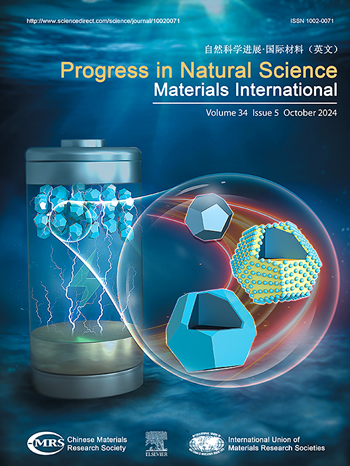高强度Mg-Zn-Zr-Mn合金的体外和体内评价:有前景的生物相容性和医学翻译降解
IF 7.1
2区 材料科学
Q2 MATERIALS SCIENCE, MULTIDISCIPLINARY
Progress in Natural Science: Materials International
Pub Date : 2025-04-01
DOI:10.1016/j.pnsc.2024.12.017
引用次数: 0
摘要
镁合金由于其优异的生物相容性和可生物降解性,在骨科植入物中得到了广泛的应用,这消除了二次手术去除的需要。然而,大多数镁合金不受控制的快速降解会导致植入物的早期失效,并伴有意想不到的气体积聚,干扰周围组织的再生。本文介绍了一种新型Mg-Zn-Zr-Mn镁合金,该镁合金含有低浓度的生物相容性元素,既能形成单相合金,又能减少多相电偶腐蚀造成的腐蚀。这些合金还表现出优异的力学性能,抗拉强度达332 MPa,具有良好的生物相容性。通过电化学测试、质量损失和氢气释放等方法对其进行了体外降解试验,观察到其降解行为几乎恒定。以山羊为模型进行了体内降解实验,长期观察表明新镁合金具有良好的生物相容性和可控的降解模式。我们的研究结果为我们的新镁合金的体外和体内性能提供了见解,它们在骨科植入物的广泛应用中具有很大的前景。本文章由计算机程序翻译,如有差异,请以英文原文为准。
In vitro and in vivo evaluation of high-strength Mg-Zn-Zr-Mn alloy: Promising biocompatibility and degradation for medical translations
Magnesium alloys have gained popularity in orthopedic implants due to their excellent biocompatibility and biodegradability, which eliminates the need for secondary surgeries for removal. However, uncontrolled rapid degradation of most magnesium alloys can lead to early failure of implants with unexpected accumulation of gas, disturbing regeneration of surrounding tissues. In this article, we introduce new Mg-Zn-Zr-Mn magnesium alloys with biocompatible elements in low concentrations, which can form single-phase alloy and diminish corrosion due to galvanic corrosion due to multiple phases. These alloys also demonstrated outstanding mechanical properties with tensile strength of 332 MPa and excellent biocompatibility. Degradation tests were conducted in vitro by electrochemical tests and measuring mass loss and hydrogen gas released, and nearly constant degradation behavior was observed. In vivo degradation experiments were done using goats as models, and long-term observation demonstrated excellent biocompatibility and controlled degradation pattern of our new Mg alloys. Our results provided insights into the in vitro and in vivo performance of our new Mg alloys, and they can be highly promising for widespread use in orthopedic implants.
求助全文
通过发布文献求助,成功后即可免费获取论文全文。
去求助
来源期刊
CiteScore
8.60
自引率
2.10%
发文量
2812
审稿时长
49 days
期刊介绍:
Progress in Natural Science: Materials International provides scientists and engineers throughout the world with a central vehicle for the exchange and dissemination of basic theoretical studies and applied research of advanced materials. The emphasis is placed on original research, both analytical and experimental, which is of permanent interest to engineers and scientists, covering all aspects of new materials and technologies, such as, energy and environmental materials; advanced structural materials; advanced transportation materials, functional and electronic materials; nano-scale and amorphous materials; health and biological materials; materials modeling and simulation; materials characterization; and so on. The latest research achievements and innovative papers in basic theoretical studies and applied research of material science will be carefully selected and promptly reported. Thus, the aim of this Journal is to serve the global materials science and technology community with the latest research findings.
As a service to readers, an international bibliography of recent publications in advanced materials is published bimonthly.

 求助内容:
求助内容: 应助结果提醒方式:
应助结果提醒方式:


